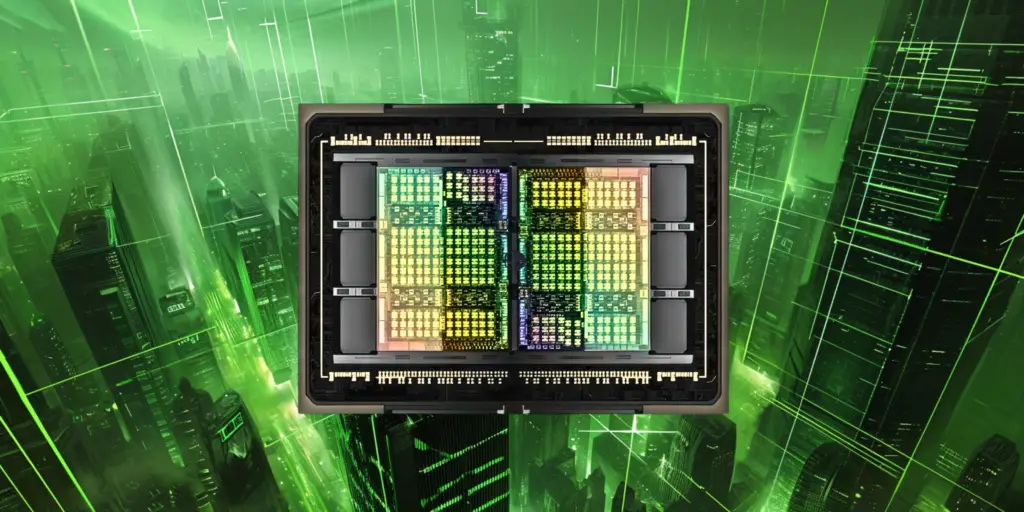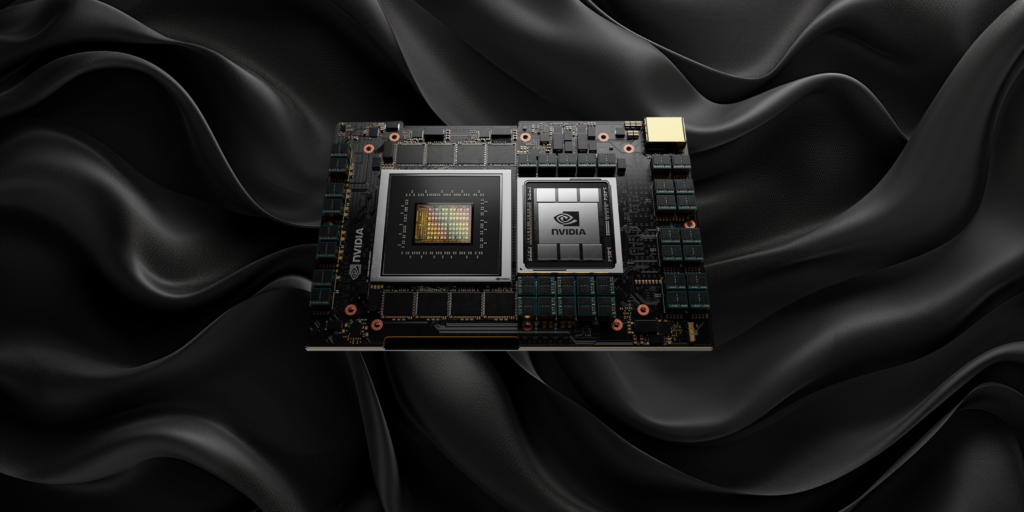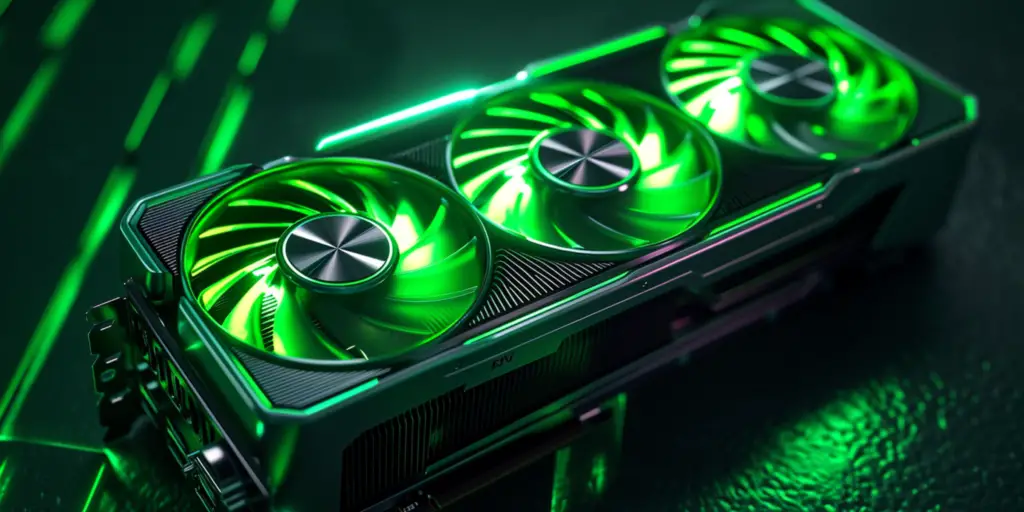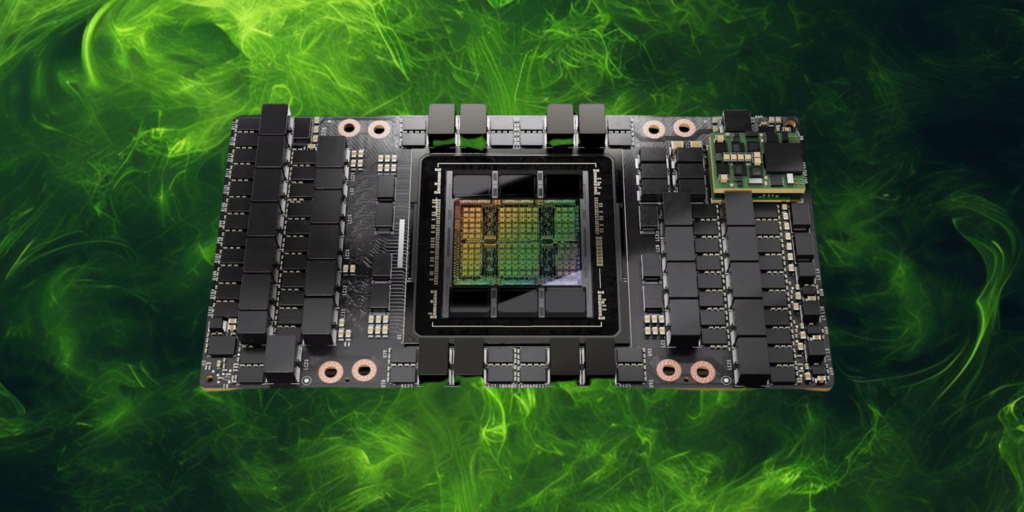Nvidia once again underscored its Unrivaled position in the realm of artificial intelligence with the unveiling of its latest marvel, the Blackwell processor. Named in honour of David Blackwell, the first Black scholar to be inducted into the National Academy of Sciences, this new AI processor is set to redefine the boundaries of AI technology.
Promising multiple times the performance speed in both the development and application stages of AI models, Blackwell represents a leap forward in the capabilities of AI processing.
With Nvidia already recognized as a titan in the tech industry, the introduction of Blackwell not only cements its status as a key player but also highlights the company’s continuous drive toward innovation and excellence in AI.
As we delve into the details of this significant technological advancement, it’s clear that Nvidia’s Blackwell is not just a successor to its previous processors but a beacon of the future, illuminating the path for the next industrial revolution powered by artificial intelligence.
The Blackwell Processor
Nvidia’s unveiling of the Blackwell processor at the GTC conference marks a significant milestone in the evolution of artificial intelligence computing.
This new processor is engineered to redefine efficiency and performance in AI model training and inference, showcasing unprecedented capabilities that position it multiple times ahead of its predecessors in handling AI underpinnings.
The Blackwell processor is a testament to Nvidia’s commitment to pushing the boundaries of AI technology, further solidifying its dominance in the AI computing space.
The Blackwell processor stands out with its astounding technical architecture, comprising 208 billion transistors.
This colossal number of transistors underlines the processor’s immense computational power, capable of managing the complex requirements of modern AI workloads with unprecedented speed and efficiency.
Such an advanced technical foundation enables Blackwell to process AI-related tasks faster than ever before, significantly reducing the time required for training sophisticated AI models and performing intricate inference operations.
Named after David Blackwell, a pioneering mathematician and the first Black scholar inducted into the National Academy of Sciences, the processor carries a legacy of innovation and excellence.
This naming not only honours a significant figure in the history of science but also reflects Nvidia’s dedication to celebrating diversity and achievement in the scientific community.
The introduction of Blackwell is poised to have a profound impact on the industry, with major data center operators such as Amazon.com Inc., Microsoft Corp., Alphabet Inc.’s Google, and Oracle Corp. expected to deploy Blackwell-based products.
These operators, who are at the forefront of global data processing and AI services, anticipate the arrival of Blackwell-based products later this year, indicating a swift integration of Nvidia’s latest technology into the core of the world’s data infrastructure.
Nvidia’s Blackwell processor is more than just a technological advancement; it’s a pivotal moment in AI computing that is set to catalyse a new era of innovation.
With its groundbreaking capabilities, Blackwell is not merely continuing Nvidia’s legacy but is also shaping the future of AI, offering a glimpse into a world where AI can be developed and applied with extraordinary speed and efficiency.

Strategic Deployments
The strategic introduction of Nvidia’s Blackwell processor into the market is not just a testament to the company’s innovation in AI technology but also a clear indication of its broader ambitions for market expansion and dominance by collaborating with the world’s largest data center operator—Amazon. Com Inc., Microsoft Corp., Alphabet Inc.’s Google, and Oracle Corp.
Nvidia is ensuring that Blackwell’s cutting-edge capabilities are integrated into the infrastructure that powers much of the global digital economy.
This strategic deployment is expected to significantly enhance the performance and efficiency of services offered by these operators, from cloud computing to consumer services and beyond.
The anticipated integration of Blackwell-based products into these operators’ services later this year signifies a major leap forward in computing technology’s practical applications.
Such deployment not only cements Nvidia’s relationships with these key industry players but also showcases the company’s ability to drive innovation at the very heart of the digital world.
The move is poised to bolster Nvidia’s presence and influence across a range of industries, further expanding its market reach.
The launch of Blackwell and its adoption by major data center operators highlights a crucial aspect of Nvidia’s market expansion strategy: the creation of indispensable technology solutions for the AI-driven future.
By providing the computational backbone for the next generation of AI applications, Nvidia is positioning itself as the go-to provider of the foundational technology necessary for harnessing the full potential of AI across various sectors.
This not only includes traditional tech industries but also extends to healthcare, finance, automotive, and government sectors, among others.
Nvidia’s market position has been significantly bolstered by its technological advancements, with the company’s valuation soaring to unprecedented heights.
The introduction of Blackwell is expected to further this trend, with Nvidia being the first chipmaker to achieve a market capitalization of over $2 trillion. This valuation reflects the market’s confidence in Nvidia’s continued growth and its role in shaping the future of computing.
The strategic deployment of the Blackwell processor and the subsequent market expansion are crucial elements of Nvidia’s long-term vision. By ensuring that its technology is at the forefront of the AI revolution, Nvidia is not just influencing the current landscape of digital technology.
Still, it is also paving the way for future innovations. In doing so, the company is not only expanding its market reach but also establishing a legacy that will likely define the future of AI computing.
Nvidia’s Market Position
Nvidia’s unveiling of the Blackwell processor cements its leadership in the artificial intelligence computing domain, further bolstering its market position as a pioneering force behind technological advancements.
This strategic move underscores Nvidia’s dominance in AI. This sector has propelled it to become the world’s third-most-valuable business, with a staggering market capitalization surpassing $2 trillion.
Such valuation places Nvidia behind only tech giants like Microsoft Corp. and Apple Inc., highlighting the significance of AI technology in driving the company’s astronomical growth.
The introduction of the Blackwell processor follows the success of its predecessor, the Hopper architecture, and its flagship H100 chip, which have become central to Nvidia’s explosive sales and market dominance.
These AI accelerator chips have revolutionized the field, turning Nvidia into a key player in the technology sector. Blackwell is poised to continue this trajectory, offering multiple times the performance in handling AI models’ training and inference processes.
This leap in performance and efficiency is not just a testament to Nvidia’s engineering prowess but also an indicator of the company’s strategic positioning in the ever-evolving tech landscape.
Nvidia’s impact on the industry extends beyond its financial valuation and into the realm of technological innovation and adoption.
The company’s processors, particularly with the introduction of Blackwell, are foundational to the operations of the world’s largest data center operators, including Amazon, Microsoft, Google, and Oracle.
This widespread adoption of Nvidia’s technology underscores its significant role in shaping the infrastructure that powers the modern digital economy.
Nvidia’s chips are integral to a multitude of applications, ranging from cloud computing and artificial intelligence to gaming and professional visualization, driving advancements across these sectors.
Nvidia’s influence in the industry is magnified by its ability to set new benchmarks for AI computing performance. By pushing the boundaries of what’s possible in AI model training and inference, Nvidia is not only enhancing the capabilities of current technologies.
Still, it is also facilitating the development of new applications and services that were previously unattainable. This leadership role in innovation has a ripple effect throughout the tech ecosystem, fostering a competitive environment that accelerates the pace of technological progress.
Nvidia’s market position and its impact on the industry are further solidified by its strategic collaborations and partnerships. By working with other leading companies to integrate its AI technologies into a wide range of products and services.
Nvidia is ensuring that its processors become an indispensable part of the technological infrastructure of the future. These collaborations extend Nvidia’s reach into new markets and applications, amplifying its influence across the tech industry.

Technological Innovations
Nvidia’s Blackwell processor represents a leap in technological innovation and advancement, pushing the boundaries of artificial intelligence computing into new realms.
This groundbreaking processor is designed to address the increasingly complex demands of AI model training and inference, showcasing a suite of technological enhancements that set new industry standards for speed, efficiency, and performance.
One of the most notable advancements in the Blackwell processor is its sheer scale of complexity, featuring an unprecedented 208 billion transistors.
This vast array of transistors enables Blackwell to execute AI processes with unparalleled precision and speed, significantly reducing the time required for both training sophisticated AI models and performing complex inference tasks.
The processor’s architecture reflects a monumental stride in semiconductor technology, showcasing Nvidia’s commitment to overcoming the physical and engineering challenges inherent in producing such an advanced chip.
The design of the Blackwell processor also introduces a novel approach to tackling the limitations of conventional semiconductor manufacturing techniques. Given its immense complexity, Blackwell utilizes a two-chip architecture that seamlessly integrates through a sophisticated connection, ensuring they operate as one cohesive unit.
This innovative design solution is indicative of Nvidia’s forward-thinking approach to chip design, allowing for the integration of more computational power into a single processor unit.
Manufacturing the Blackwell processor involves the use of Taiwan Semiconductor Manufacturing Co.’s advanced 4NP production technique.
This technique is crucial for bringing the intricate two-chip design of Blackwell to life, underscoring the importance of cutting-edge semiconductor fabrication technologies in the realization of next-generation AI processors.
Beyond its architectural and manufacturing innovations, Blackwell boasts enhanced features for AI data processing. It introduces an improved ability to link with other chips, facilitating more efficient data transfer and communication within complex computing environments.
Blackwell features a new method for crunching AI-related data, optimizing the processing workflow to significantly speed up AI computations.
The Blackwell processor is part of Nvidia’s next version of its “super chip” lineup, indicating its strategic importance in Nvidia’s ecosystem of AI computing solutions.
It is designed to work in tandem with Nvidia’s central processing unit called Grace, offering users the flexibility to pair the Blackwell processor with new networking chips that support both the proprietary InfiniBand standard and the more common Ethernet protocol.
This level of integration and versatility underscores Nvidia’s vision for a comprehensive AI computing platform that addresses the diverse needs of modern AI applications.
Applications and Future Directions
The unveiling of Nvidia’s Blackwell processor heralds not just an evolution in artificial intelligence computing capabilities but also opens new avenues for application and future technological directions.
Blackwell’s unparalleled computational power and efficiency make it a pivotal force in transitioning AI from handling relatively straightforward tasks to undertaking complex, multistage operations and processing vast AI models with potentially trillions of parameters.
This leap forward is set to revolutionize how industries and sectors leverage AI, pushing the boundaries of innovation and operational efficiency.
With Blackwell’s advanced capabilities, industries ranging from healthcare to automotive, finance, and beyond are poised to witness transformative changes.
Blackwell’s introduction also signals a significant expansion in AI-as-a-service offerings. Cloud service providers, powered by Blackwell, can offer more sophisticated AI tools and services, enabling businesses and developers to build and deploy AI applications more efficiently and cost-effectively than ever before.
This democratization of AI capabilities could spur innovation across every digital touchpoint, from smart city infrastructure to personalized consumer experiences.
The scientific community stands to benefit immensely from Blackwell’s capabilities, particularly in fields requiring the processing of vast amounts of data, such as climate modeling, astrophysics, and genomics.
Blackwell’s processing power can drastically reduce the time needed for simulations and analyses, accelerating the pace of discovery and enabling researchers to tackle previously insurmountable computational challenges.
One of the most exciting prospects of Blackwell is its potential to drive AI’s creative capabilities to new heights.
With the ability to support models with trillions of parameters, Blackwell can enable the development of AI that can generate highly realistic and complex digital content, from 3D environments and realistic video sequences to innovative design and art. This could revolutionize industries reliant on digital content creation, such as entertainment, marketing, and virtual reality.
Looking ahead, the integration of Blackwell into Nvidia’s ecosystem signifies a step towards a more interconnected and versatile AI computing landscape.
Nvidia’s vision for Blackwell involves not just standalone processing power but a holistic approach that includes seamless integration with CPUs, networking chips, and server platforms.
This strategy underscores a future direction where AI computing is not just about raw performance but about creating a cohesive, scalable, and flexible infrastructure capable of supporting the next wave of AI applications and services.

Final thoughts
The revelations at Nvidia’s GTC conference, highlighted by the unveiling of the Blackwell processor, signify a pivotal moment in the trajectory of AI technology and its integration across industries. Nvidia’s advancements, as showcased in San Jose, underscore the company’s unrelenting pursuit of innovation and its commitment to leading the charge in the AI revolution.
The Blackwell processor, with its groundbreaking capabilities in AI model training and inference, is set to redefine the landscape of AI computing, offering unprecedented levels of performance and efficiency.
Nvidia’s strategic collaborations with industry giants and its foray into new applications, from digital twin technology with Apple’s Vision Pro headset to enhancing robotic capabilities with Project Groot, illustrate a vision for a future where AI is omnipresent.
These partnerships not only extend Nvidia’s technological footprint but also showcase its ability to drive multi-industry transformations, from healthcare and automotive to robotics and digital content creation.
The implications of Nvidia’s innovations extend beyond mere technological advancements; they signal a shift toward a more interconnected and intelligent world. As AI technology becomes increasingly integrated into the fabric of daily life, Nvidia’s role as a catalyst for this change is undeniable.
The company’s focus on developing versatile, powerful, and efficient AI processors, coupled with its efforts to foster collaboration across sectors, sets the stage for a future where AI’s potential is limited only by imagination.
Nvidia’s showcase at the GTC conference not only highlights its current achievements and market position but also paints a picture of a future shaped by AI.
With the Blackwell processor at the forefront of this transformation, Nvidia continues to chart a course toward an era of enhanced innovation, efficiency, and global impact.
The company’s vision for a world where technology and AI seamlessly converge offers a glimpse into a future that promises to revolutionize industries, redefine creativity, and enhance the human experience in ways previously unimaginable.


